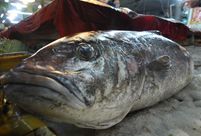 Bikini show in 2014 China Final of Miss Tourism World
Bikini show in 2014 China Final of Miss Tourism World
 Close-up view of August Aerobatic Team
Close-up view of August Aerobatic Team
 Goddesses married in 2014
Goddesses married in 2014
 Polar region photos raise worldwide awareness of global warming
Polar region photos raise worldwide awareness of global warming
 Get off at the last stop — Beijing Subway in vision
Get off at the last stop — Beijing Subway in vision
 Top 100 beauties in the world!
Top 100 beauties in the world!
 Gallery: Who is the most beautiful one?
Gallery: Who is the most beautiful one?
 If you like autumn, put your hands in the air!
If you like autumn, put your hands in the air!
 Fan Bingbing's "Queen style" in new play
Fan Bingbing's "Queen style" in new play
 Lingerie show at 2014 Miss China
Lingerie show at 2014 Miss China
BEIJING, Dec. 22 -- A draft revision to China's Food Safety Law, tabled for its second reading on Monday, introduces detention for offenders.
Those who add inedible substances to foods could find themselves behind bars for up to 15 days, according to the bill submitted to the bi-monthly legislative session of the National People's Congress (NPC) Standing Committee.
Administrative detention normally refers to that imposed by police without court proceedings. This is considered a tough penalty since other punishments specified in the Food Safety Law mostly involve fines and revocation of certificates.
For more serious offences, suspects will be subject to the Criminal Law. At the first reading in August, lawmakers argued that the current law is not clear on what should be considered a criminal offense.
The new version also adds punishments for adding expired material or additives to products. In July, Shanghai Husi Food Co. Ltd, a supplier to McDonald's and KFC, was found using reprocessed expired meat in its products. Six of the company's senior executives were arrested and the draft makes specific provisions for this kind of offense.
The fine for producers will be ten to 20 times the total product value if more than 10,000 yuan (1,600 US dollars). For products worth less than 10,000 yuan, the fine will be 50,000 to 100,000 yuan. Production certificates will be revoked for serious offences.
Monday's version of the bill allows prosecution of landlords of production sites who turn a blind eye to illegal activities on their premises, but exempts distributors from punishment if they can show that they followed procedure and were unaware of suppliers' practices.
TOXIC PESTICIDES
At the previous reading, lawmakers were concerned by toxic pesticides, an issue that has now been addressed to some extent.
The country still stocks certain highly toxic pesticides for emergency use and a full ban is not realistic, but a new article will encourage use of low toxicity pesticides and will speed up a full ban on the highly toxic. Administrative detention will be allowed for offenders who illegally use highly toxic alternatives, but at Monday's panel discussion, lawmakers continued to press for more specific regulations.
Wang Mingwen, standing committee member, noted that since a full ban is not realistic right now, the law should at least regulate pesticide use as strictly as possible. Others called for a timetable for a full ban and detailed rules on when and how to use the most dangerous types.
Shen Depei, another committee member, suggested a strict definition of exactly what constitutes an emergency when toxic pesticides could be used and wants close monitoring of production, distribution and storage.
According to agriculture authorities, the use of highly toxic pesticides has dropped substantially in the past decade.
GENETICALLY MODIFIED FOOD
Another controversial issue, genetically modified foods, did not go unnoticed. The new bill requires producers to label their products appropriately if they contain any genetically modified ingredients listed by the Agriculture Ministry.
While mandatory labelling protects consumers' right to know, more specific labelling rules are needed. Since public knowledge of genetic modification is still low, a simple label might cause confusion and further alienate the public, said Xu Weigang, agriculture expert and committee member.
"Labelling does not mean that genetically modified foods are unsafe, but the public might not see it that way," Xu said. Producers should include brief details of genetic modifications to let consumers make more informed choices.
The bill eases import procedures for mainstream dietary supplements such as vitamins and mineral supplements. Importers will only need to inform authorities when they first import these products, but will have to register imported supplements that use new ingredients or have never been imported before.
 Joint anti-piracy drill
Joint anti-piracy drill Unknown 'monster' fish caught in Shandong
Unknown 'monster' fish caught in Shandong 20 years on: Relocated Three Gorges residents through lens
20 years on: Relocated Three Gorges residents through lens Beautiful Chinese woman
Beautiful Chinese woman Chestnut girl goes viral online
Chestnut girl goes viral online PLA HK Garrison veterans leave behind beautiful smiles
PLA HK Garrison veterans leave behind beautiful smiles Victoria's Secret Fashion Show
Victoria's Secret Fashion Show Representative beauties
Representative beauties Excellent photos of Zhuhai Air Show
Excellent photos of Zhuhai Air Show AIDS response for expats
AIDS response for expats China set to lower GDP growth target
China set to lower GDP growth target Fake euros popular on Taobao
Fake euros popular on Taobao How long can Russia withstand the crisis?
How long can Russia withstand the crisis?Day|Week|Month